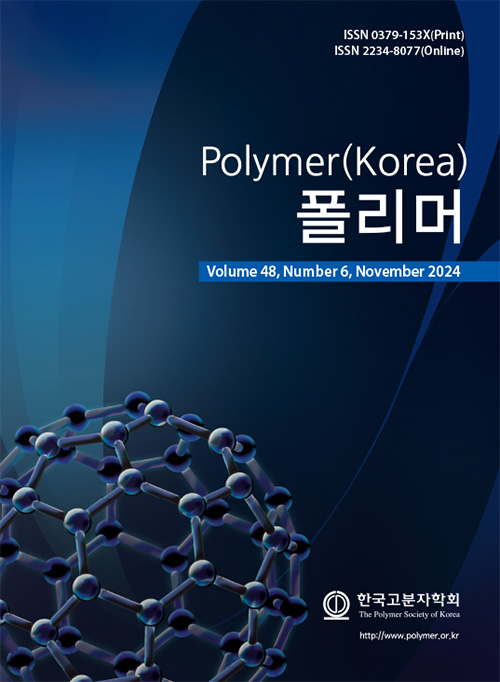- [Review]
- Synthesis of Photoactive Layer Materials in Organic Photovoltaics: an Asymmetric Molecular Approach
Wooteak Jung, Sehwa Hong, Sung Mo Moon*, and Sung Yun Son*,†

Department of Chemical Engineering, Pohang University of Science and Technology, 77 Cheongam-Ro, Nam-Gu, Pohang, Gyeongbuk 37673, Korea
*Department of Chemistry, Kwangwoon University, 20 Kwangwoon-Ro, Seoul 01897, Korea- 유기태양전지에서의 광활성층 물질 합성: 분자의 비대칭성적 접근
포항공과대학교 화학공학과, *광운대학교 화학과
Reproduction, stored in a retrieval system, or transmitted in any form of any part of this publication is permitted only by written permission from the Polymer Society of Korea.
The photoactive layer materials in organic solar cells are the most critical factor determining the efficiency of the cells. However, as the efficiency of current photoactive materials approaches theoretical limits, novel molecular designs are increasingly necessary. Typically, photoactive materials are composed of donor and acceptor components, synthesized as small molecules or polymers. Traditionally, these donors and acceptors have been designed with symmetric structures due to their simple synthesis and analysis. However, such uncomplicated structures have clear limitations in further enhancing efficiency. To overcome these challenges, asymmetric structures have been proposed as a new type of photoactive material, with significant research focused on inducing strong interactions between these asymmetrically structured molecules. This review aims to introduce the latest domestic and international trends in the development of asymmetric molecules, which are currently gaining significant attention.
유기 태양전지에서 광활성층 물질은 태양전지의 효율을 결정짓는 가장 중요한 요소이다. 하지만 현재 광활성층 물질의 효율이 이론적 한계에 접근하면서 새로운 형태의 분자 설계가 요구되고 있다. 대부분의 광활성층 물질은 도너(Donor)와 어셉터(Acceptor)로 구성되며, 이들은 단분자 혹은 고분자 형태로 합성한다. 지금까지의 도너와 억셉터는 비교적 합성과 분석이 용이한 대칭 구조로 설계되었다. 하지만 이런 단순한 구조는 효율을 보다 증가하는데 있어 한계점이 분명하다. 이를 극복하기 위해 새로운 형태의 광활성층 물질로서 비대칭구조가 제시되었으며, 비대칭구조 분자간의 강한 상호작용을 유도하는 연구가 많이 진행되고 있다. 본 총설에서는 현재 주목받고 있는 비대칭분자를 구현한 국내외 기술 동향을 소개하고자 한다.
Keywords: organic solar cells, photoactive layer materials, asymmetric structure, small molecule, polymer.
- Polymer(Korea) 폴리머
- Frequency : Bimonthly(odd)
ISSN 0379-153X(Print)
ISSN 2234-8077(Online)
Abbr. Polym. Korea - 2024 Impact Factor : 0.6
- Indexed in SCIE
 This Article
This Article
-
2024; 48(6): 594-602
Published online Nov 25, 2024
- 10.7317/pk.2024.48.6.594
- Received on Sep 6, 2024
- Revised on Oct 16, 2024
- Accepted on Oct 18, 2024
 Correspondence to
Correspondence to
- Sung Yun Son
-
*Department of Chemistry, Kwangwoon University, 20 Kwangwoon-Ro, Seoul 01897, Korea
- E-mail: syson@kw.ac.kr








 Copyright(c) The Polymer Society of Korea. All right reserved.
Copyright(c) The Polymer Society of Korea. All right reserved.